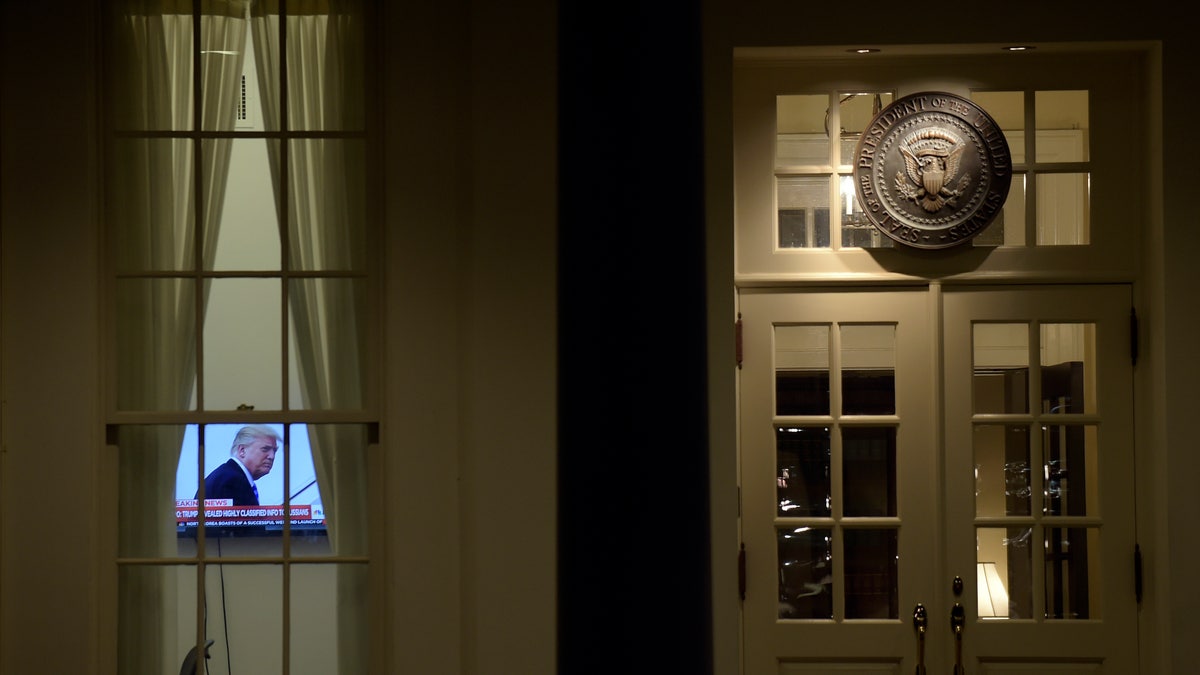
WASHINGTON – Closed-door emergency meetings. Hallways packed with reporters. Statements rushed out, but few questions answered.
It's become a familiar scenario in the crisis-prone Trump White House, where big news breaks fast and the aides paid to respond seem perpetually caught off-guard.
The Washington Post report Monday led to the latest feeding frenzy. The news that Trump revealed highly classified information to Russian officials in a meeting last week prompted another round of bizarre scenes, just days after Trump's decision to fire FBI director James Comey sent his communications team into a tizzy.
They included a surprise encounter between reporters and Trump's top national security adviser and an attempt to drown out conversations with a blaring television.
White House officials denied the story in several statements, including a 45-second on-camera statement delivered by Trump's national security adviser. But officials refused to answer specific questions, including what precisely the report had gotten wrong, ensuring it would dominate a week that White House officials hoped would be quiet in advance of the president's first foreign trip.
Reporters started gathering in the hallway outside Press Secretary Sean Spicer's office right after the Post story broke. As the group grew to more than 20 people, press aides walked silently by as journalists asked for more information. Soon, three of the four TV channels being played in the press area were reporting the Post story.
At one point National Security Adviser H.R. McMaster, who would later deliver the televised denial, stumbled into the crowd of journalists as he walked through the West Wing.
"This is the last place in the world I wanted to be," he said, nervously, as he was pushed for information. "I'm leaving. I'm leaving."
Not long after, the press office sent a trio of short, written statements. Then Spicer briefly appeared to say McMaster would speak outside soon, prompting a mass exodus to a bank of microphones set up in the West Wing driveway.
"I was in the room, it didn't happen," McMaster told reporters after emerging.
"The president and the foreign minister reviewed a range of common threats to our two countries including threats to civil aviation," McMaster said. "At no time, at no time were intelligence sources or methods discussed and the president did not disclose any military operations that were not already publicly known."
But what, precisely, had been misreported?
The Post cited current and former U.S. officials who said Trump had shared classified details with Russian Foreign Minister Sergei Lavrov and Russian Ambassador to the U.S. Sergey Kislyak. They said the information, which had been provided by a U.S. partner through an intelligence-sharing arrangement, was considered so sensitive that details have been withheld from allies and tightly restricted even within the U.S. government.
The Post story did not claim that Trump revealed any specific information about how the intelligence was gathered, as McMaster's denial suggested.
Reporters immediately returned to Spicer's office, hungry for answers.
As they huddled in a hallway, one eagle-eyed reporter for the conservative One America News Network spotted a handful of staffers, including Spicer and spokeswoman Sarah Huckabee Sanders, walking not far from Spicer's office.
Soon after, faint, muffled sounds were heard coming from that direction.
It was unclear precisely where they were coming from or what they were — but after a reporter tweeted about the noise, White House staffers quickly turned up the volume on the office television, blaring a newscast loudly enough to drown out any other potential noise.
Around 7:30 p.m., Sanders emerged to announce that White House officials would not be answering any more questions for the evening.
"We've said all we're going to say," she said, asking reporters to clear the hallway.
They obliged.
__
Follow Colvin and Lucey on Twitter at https://twitter.com/colvinj and https://twitter.com/catherine_lucey
.









































